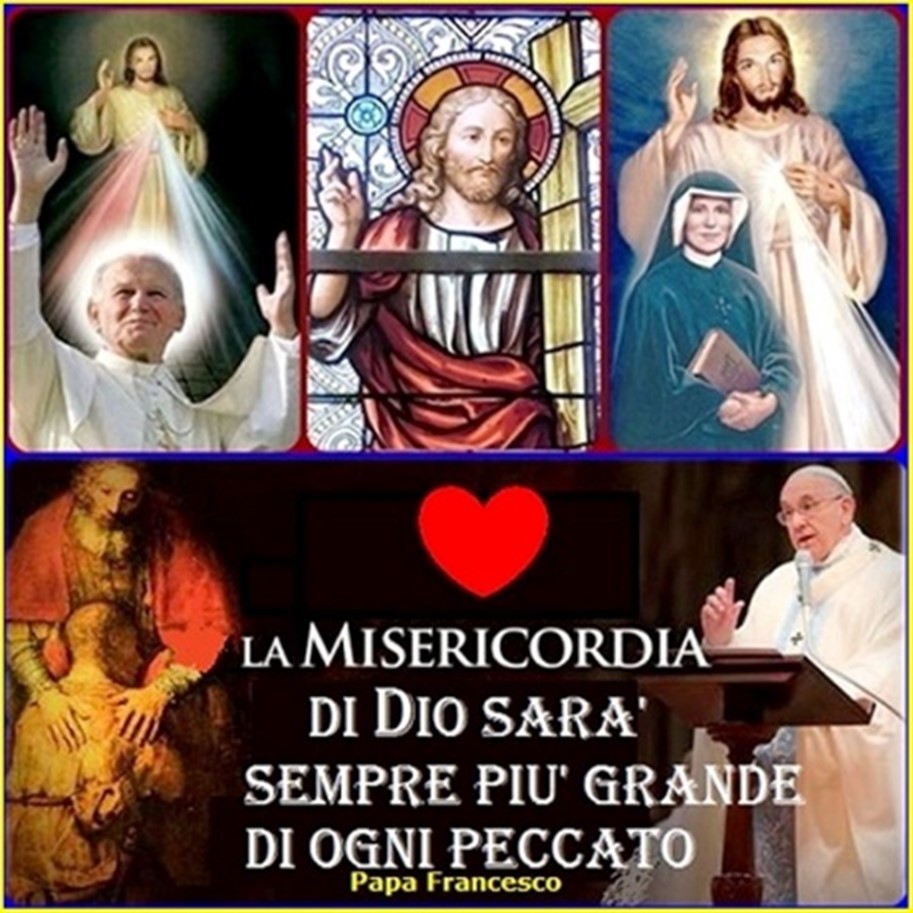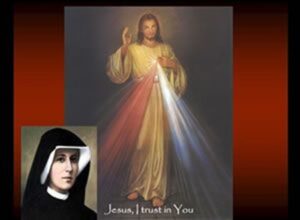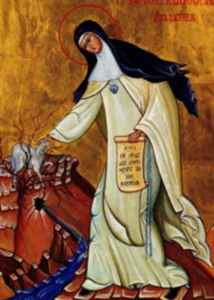
Feast of Divine Mercy
Life flourishes again only when we experience the warmth of a God who is near, ready to heal our wounds
“I wish the first Sunday after Easter to be the Feast of My Mercy. My daughter, speak to the whole world of My immeasurable Mercy!” Thus the Lord addressed Sister Faustina Kolwaska, a Polish nun of poor and uneducated origins, but tenacious and humble and characterised by an unlimited trust in God to whom Jesus entrusted the message of Divine Mercy addressed to the whole world. (Source: Jesus I trust in you).

St Faustina’s mission is to remind us of a truth of faith that has always been known, but forgotten, concerning God’s merciful love for mankind and the transmission of new forms of worship of Divine Mercy, the practice of which should lead to the renewal of the life of faith in the spirit of Christian trust and mercy.
According to Jesus’ wish, the Feast of Divine Mercy is celebrated on the second Sunday after Easter to emphasise the close connection between the Paschal Mystery of Salvation and the Feast.

The picture of the Merciful Jesus reproduces the vision that St Faustina had in Plock, Poland, on 22 February 1931. During this vision, Jesus Christ expressed the desire for the picture to be painted with the words ‘Jesus I trust in you’. The worship of this image consists of confident prayer combined with daily works of mercy.
MERCY REPRESENTS THE TURNING POINT OF THE CONCILIAR CHURCH
“Now the Bride of Christ prefers to use the medicine of mercy
instead of taking up the weapons of severity.” (Pope John XXII)

www.bibliotecadibabele.com
CHRISTIANS JEWS AND MUSLIMS AGREE ON THE PRIMACY OF GOD’S MERCY
If one had to sum up the whole Bible in one sentence, we could say that it is the story of man who often errs and of God who always accepts him with his forgiveness. “Where sin abounded, grace abounded”(Rom 5:20), says the Apostle Paul. It is no coincidence that he uses ‘overabound’ to emphasise that God’s mercy is infinitely greater than the measure it would take to forgive sin.

www.intornotirano.it
All three great monotheistic religions say that God is merciful. In the book ofExodus, we read: ‘The Lord thy God is a merciful God, he will not forsake thee’, and again: ‘The Lord, God, merciful and gracious, slow to anger and abounding in mercy and faithfulness‘. In the Gospel we find this sentence of Jesus: ‘Be merciful, as your Father is merciful‘. “In the name of God, the Clement, the Merciful,” Muslims recite in their ritual prayers. As we can see, Jews, Christians and Muslims believe that God is merciful, because he is capable of infinite love, who always welcomes those who err and forgives them.
IN THESE OUR VIOLENT AND DARK TIMES
OF A ‘THIRD WORLD WAR IN PIECES’
IT IS URGENT TO ACTIVATE
DAILY PRACTICES OF MERCY
LET US GET INVOLVED
AND URGE THE GREAT OF THE EARTH
TO PROMOTE PEACE LAND AND DIGNITY
“Mercy is the only true and ultimate effective reaction against the power of evil. Only where there is mercy does cruelty end, evil and violence end.” (Pope Benedict)
CENTRALITY OF MERCY IN THE SPIRITUAL EXPERIENCE OF SAINT MARY EUPHRASIA
The encounter with God of Rosa Virginia Pellettier, later Mother Mary of St Euphrasia Pellettier, took place in adolescence, at a time of grief and despondency. After the death of her father in 1810, she felt torn away from her family (she would never see her mother again) and from the carefree life full of affection on the island of Noirmoutier, on the Atlantic coast of France, where she had been born in 1796. In Tours, on the other hand, the strict ‘boarding school of the Christian Association, with high walls, bolted doors, where discipline consists mainly of prohibitions and admonitions‘ awaited her.
(cf. From our Holy Mother to us the essentials do not change, Conferences, Angers 1972).
Here, wounded and uprooted, her heart discovers that she was loved with a love ‘beyond comprehension’. Shattered by suffering, Rosa Virginia’s heart opens to receive an extraordinary intuition: ‘me, you, whoever you are, whatever you do, you are LOVED’. (Saint Mary Euphrasia Pellettier foundress of the Sisters of Our Lady of Charity of the Good Shepherd, 1996 publication, on the occasion of the bicentenary of her birth).
Source:www.missionebuonpastore.org

